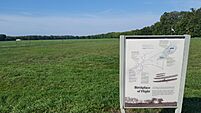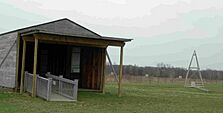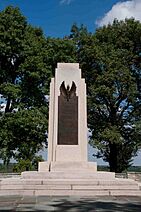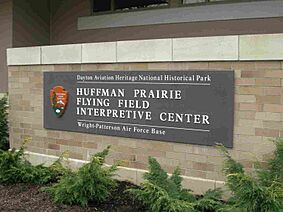Huffman Prairie facts for kids
|
Huffman Prairie Flying Field
|
|
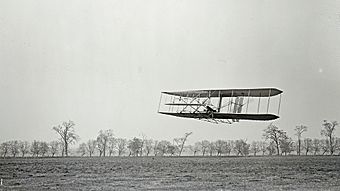
Orville Wright in flight over Huffman Prairie, approximately 1,760 feet in 40 1/5 seconds, Nov. 16, 1904
|
|
| Nearest city | Fairborn, Ohio |
|---|---|
| Area | 84.4 acres (34.2 ha) |
| Built | 1904 |
| Website | https://www.nps.gov/daav/learn/historyculture/huffman-prairie-flying-field.htm |
| NRHP reference No. | 71000640 |
Quick facts for kids Significant dates |
|
| Added to NRHP | May 6, 1971 |
| Designated NHL | June 21, 1990 |
Huffman Prairie, also known as Huffman Prairie Flying Field, is a very important place in Ohio. It's part of the Dayton Aviation Heritage National Historical Park. This 84-acre field, located near Fairborn, was where the famous Wright brothers (Wilbur and Orville) worked to build a reliable and controllable airplane. They also taught themselves how to be pilots here. Many early aircraft records were set by the Wrights at Huffman Prairie.
The Wright Brothers' Flying Field
How Huffman Prairie Became a Test Site
The Wright brothers started using Huffman Prairie in 1904. They got permission from the field's owner, a banker named Torrence Huffman. The field was easy to reach because it was near a trolley stop called Simms Station. This stop was about 8 miles (13 km) from their hometown of Dayton. In April 1904, they began testing their new airplane, the Wright Flyer II, at this location.
Developing the First Practical Airplane
The Wrights made about 150 flights at Huffman Prairie between 1904 and 1905. These tests helped them create the 1905 Wright Flyer III. They believed this aircraft was the first truly practical airplane. Today, this restored aircraft is on display at the Carillon Historical Park in Dayton.
Training Early Pilots at Huffman Prairie
In 1910, the Wright Company set up its testing and flight school at Huffman Prairie Flying Field. The Wright Flying School trained over a hundred pilots. These pilots included members of the Wright Exhibition Team and early military aviators. Famous pilots like Henry H. "Hap" Arnold and Thomas DeWitt Milling learned to fly here. In 1917, the United States Army bought the field and renamed it Wilbur Wright Field. Later, in 1948, it became part of Wright-Patterson Air Force Base.
Visiting Huffman Prairie Flying Field Today
Exploring the Historic Flying Field
The National Park Service now manages this historic site. Visitors can see the exact spot where the Wrights perfected their airplane. There are also replicas of their 1905 hangar and the launching catapult they used. The flying field is kept mowed short, just like the grazed pasture the Wrights used. This allows for re-enactment flights.
Discovering Nature and Wildlife
Next to the flying field, there's an area of tall-grass prairie that is not mowed. This natural area is managed using controlled burns in the late season. A nature trail winds through the tall grasses, where you can see many different wildflowers and occasional shrubs. The Huffman Prairie area is inside the Air Force Base, but it has its own entrance and fences separating it from modern base facilities.
Learning at the Interpretive Center
The Huffman Prairie Flying Field Interpretive Center is about 2 miles (3.2 km) from the flying field. It's located on Wright Brother Hill, near the Wright Brothers Memorial. From here, you can look out over Huffman Prairie and other parts of the Air Force Base. This National Park Service center explains the challenges Orville and Wilbur Wright faced while building their flying machine. It also covers their first public flights, their exhibition team, and their manufacturing factory in Dayton.
The center has a Wright Flyer flight simulator that visitors can try. It also highlights how the Wright brothers' legacy continues through Wright-Patterson Air Force Base. You can learn about the ongoing aeronautical research happening at this Air Force facility.
Recognizing Huffman Prairie's Importance
Huffman Prairie Flying Field was named a National Historic Landmark in 1990. It is a key part of the Dayton Aviation Heritage National Historical Park. In 2008, it was added to the U.S. World Heritage Tentative List as part of the Dayton Aviation Sites. Also, in 1986, 109 acres (44 ha) of the natural prairie were named an Ohio Natural Area. It is also a part of the National Aviation Heritage Area.
 | Delilah Pierce |
 | Gordon Parks |
 | Augusta Savage |
 | Charles Ethan Porter |





